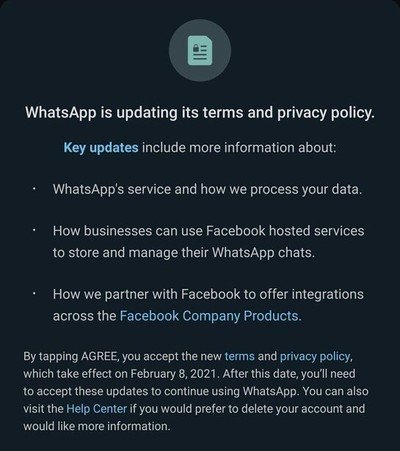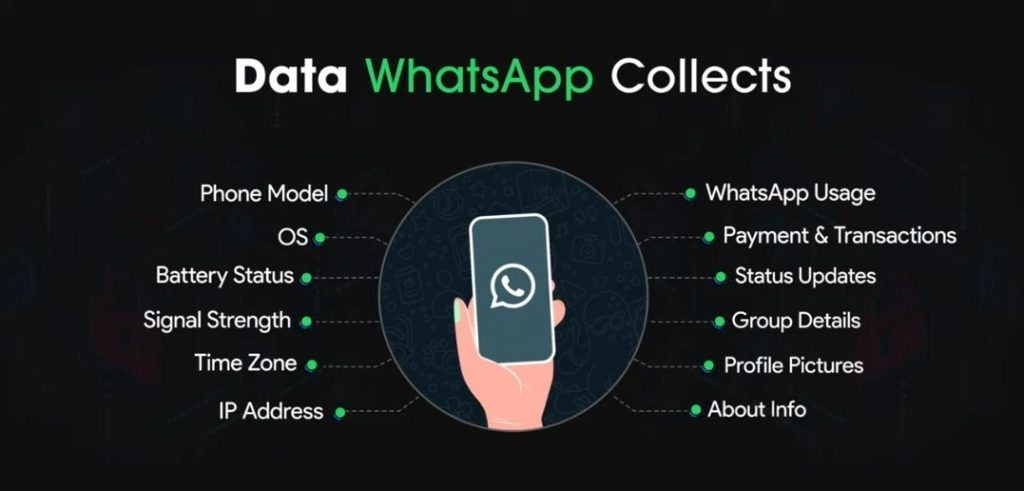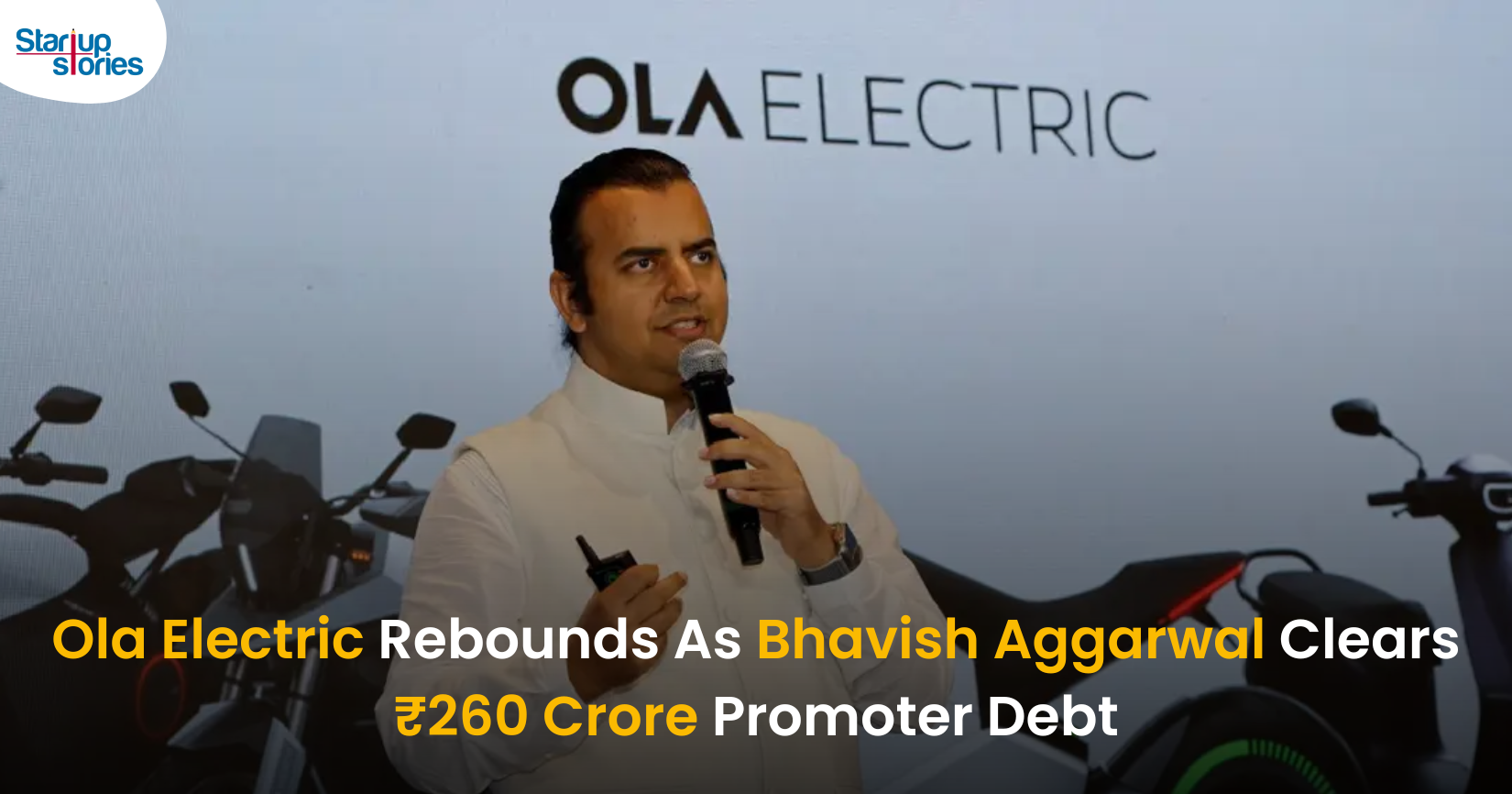Latest News
Users Flock To Signal Messaging App After Whatsapp’s Latest Privacy Policy Update

If you own a smartphone, there is a very high chance that you are a WhatsApp user. The simple and lightweight online messaging application has embedded itself into our lives and has become indispensable. Family groups, friend groups, office groups, play groups and many other groups like these see millions of conversations happening on a daily basis. Millions of people across the world use Whatsapp for multiple purposes. Beginning from a simple user to user online text messaging app, over the years Whatsapp has grown exponentially by adding a lot of features like payments, location sharing, pictures and video sharing, document sharing, group chats and calls.
Whatsapp users received a message upon opening the app on their phone which conveyed information regarding a privacy policy update. The notification carried information regarding how Whatsapp processes user data and how Whatsapp partners with Facebook to offer integration across Facebook company products. Failure to accept the policy meant a user could not use Whatsapp anymore after February 8th, 2021. This led to a huge outcry on social media about how Whatsapp is abusing user data and user privacy. Facebook and Whatsapp have always been in the spotlight time and again around discussions regarding user data privacy. But the latest policy update from Whatsapp looked like the last straw.

Millions across the world were looking for alternate platforms to migrate to from Whatsapp where they felt their data would be protected. Telegram and another recent app named Signal, suddenly saw an influx of new users following the recent Whatsapp privacy policy update.
Signal in particular saw a huge spurt in registrations following Tesla founder Elon Musk’s tweet which said Signal in response to a user asking Musk what is a good alternative to Whatsapp.
Use Signal
— Elon Musk (@elonmusk) January 7, 2021
On January 12th, 2021, nearly 800,000 users installed Signal globally. Signal could not handle the influx and their SMS verification failed to function properly. Signal has since then added more servers to cope with the surge in app downloads. Signal said the only information it collects is the phone number and they do not assign a name to the number. Whatsapp on the other hand collects a slew of data as shown in the picture below.

Whatsapp released a statement which said it is committed to protecting user data privacy and that their end to end encryption still works. Their response says “Our privacy policy update does not affect the privacy of your messages with friends or family (sic.)”
We want to address some rumors and be 100% clear we continue to protect your private messages with end-to-end encryption. pic.twitter.com/6qDnzQ98MP
— WhatsApp (@WhatsApp) January 12, 2021
ALSO READ: How Does WhatsApp Generate Revenue
Whatsapp data is instead used to improve Facebook user experience. Facebook is benefiting from Whatsapp by generating a huge wealth of consumer behavior data which inturn is being used to improve the ads on Facebook.
In this day and age when the internet is making its way to every nook and corner of the world, companies are increasingly developing an internet ecosystem in order to make lives easier. These ecosystems learn from gathering continuous data. While it is hard to pinpoint how much data should be collected and kept private and how much could be used to improve quality of lives, the choice ultimately lies with the individual.
Let us know if you are going to continue using Whatsapp or will move to SIgnal in the comments below.
Latest News
How Pronto Is Redefining 10-Minute Home Services in India with a $25 Million Fundraise

Home services startup Pronto is in advanced talks to raise about $25 million at a near-$100 million valuation, underscoring strong investor confidence in India’s fast-growing 10-minute home services market. This potential round would be the company’s third major funding milestone after its $2 million seed and $11 million Series A in 2025, backed by marquee investors such as General Catalyst, Glade Brook Capital, Bain Capital and new participant Epiq Capital. The fresh capital is expected to further strengthen Pronto’s positioning as a leading tech-led household help platform for urban consumers.
Pronto operates a 10-minute on-demand home-services platform that connects users with trained, background-verified workers for everyday tasks like sweeping, mopping, utensil cleaning, laundry and basic cooking. Using a hub-and-spoke, shift-based model, the startup stations workers at hyperlocal hubs, enabling sub-10-minute fulfilment and more predictable earnings compared to the informal domestic-help market. Founded in 2024 by Anjali Sardana and based in Delhi NCR, Pronto has already expanded from Gurugram into major cities such as New Delhi, Mumbai, Bengaluru and Pune, and is handling around 6,000 daily bookings with nearly 1,300 active professionals as of December 2025.
The upcoming $25 million fundraise is expected to be used to enter more metros, deepen presence in existing neighbourhoods with additional hubs and upgrade Pronto’s technology for smarter routing, shift planning and real-time operations. A significant portion of the capital will also go into training, retention and benefits for its workforce to maintain consistent service quality at scale, especially as competition heats up from rivals like Snabbit and Urban Company in the rapid home services space. This near-$100 million valuation not only validates Pronto’s model but also highlights a broader shift toward organised, tech-driven domestic-help solutions in India’s largely informal home-services market.
Latest News
Bhavish Aggarwal Sells ₹325 Crore Ola Electric Stake, Retains Control

Bhavish Aggarwal has sold Ola Electric shares worth about ₹325 crore over three consecutive trading sessions, primarily to fully repay a promoter-level loan of ₹260 crore and release all pledged promoter shares. Despite the stake sale, he continues to hold a significant shareholding of over 34 percent in Ola Electric, and the company has clearly stated that there is no change in promoter control or his long-term commitment to the business. This one-time, limited monetisation at the promoter’s personal level is positioned as a structural clean-up rather than a signal of reduced confidence in the company.
The transactions, executed through open-market bulk deals, included an initial sale of about 2.6 crore shares worth roughly ₹92 crore at an average price of ₹34.99 per share, followed by additional trades of around ₹142 crore and ₹90 crore, taking the total sale value to approximately ₹324–325 crore. As a result, Aggarwal’s stake has fallen by a little over 2 percent, while all previously pledged promoter shares about 3.93 percent of Ola Electric’s equity are being released, removing the overhang and risk typically associated with pledged stock. The company has also clarified that these deals do not involve any capital raise or dilution by Ola Electric itself, which is important for investors tracking promoter stake and governance.
The share sale came at a time when Ola Electric’s stock had been under pressure, even hitting an all-time closing low amid concerns around growth, competition and heavy promoter selling. However, once the company confirmed that the stake sale was complete and all promoter-level pledges would be cleared, the stock rebounded sharply, gaining around 9–10 percent as markets welcomed the removal of this technical overhang. For investors, the focus is now expected to shift back to Ola Electric’s core fundamentals EV sales growth, margins, and market-share performance in India’s two-wheeler EV segment while the reduced promoter debt risk and continued high promoter holding offer some comfort on long-term alignment.
Latest News
Kuku FM’s $200 Million IPO: Mebigo Labs Hires Top Bankers to Lead Public Listing

Kuku FM’s parent company, Mebigo Labs, has hired leading investment banks to prepare for a 200 million dollar IPO in India, marking a major milestone for the country’s digital audio ecosystem. The Mumbai-based company has reportedly appointed Kotak Mahindra Capital, Axis Bank and Morgan Stanley’s India unit to manage the proposed share sale, which is likely to be launched on Indian stock exchanges once key regulatory steps are completed. This move signals strong intent to tap public markets and test investor appetite for subscription-led regional audio platforms in India.
The planned IPO proceeds are expected to help Kuku FM expand its content library, strengthen its regional language offerings and invest in technology to enhance user experience. With a focus on Hindi, Marathi, Tamil and other Indian languages, Kuku FM aims to capture the fast-growing audience in Tier 2 and Tier 3 cities seeking affordable audiobooks, courses and storytelling content. The funds could also provide additional firepower for marketing, partnerships and product innovation, helping the platform compete more aggressively in India’s crowded digital entertainment and creator economy landscape.
Founded in 2018, Kuku FM has built a subscription-driven business model and has reportedly scaled to millions of paying users, backed by multiple funding rounds from prominent investors. Its decision to pursue a 200 million dollar IPO positions it as one of the first major Indian audio platforms to attempt a public listing, potentially paving the way for other podcast and niche content startups to follow. As the IPO process moves forward, Kuku FM’s performance in the public markets will be closely watched as a key indicator of how investors value regional, knowledge-first audio platforms in India’s booming digital economy.















xvideos
June 12, 2025 at 3:49 am
Hmmm iis anyone ese encountering prdoblems with the images oon ths blog loading?
I’m tring to determine iff iits a problem onn mmy
end orr iif it’s thhe blog. Anyy feed-back woluld be greatly appreciated.
binance konto
October 28, 2025 at 12:36 am
Thank you for your sharing. I am worried that I lack creative ideas. It is your article that makes me full of hope. Thank you. But, I have a question, can you help me?
Kuwin
November 6, 2025 at 11:44 am
kuwin sở hữu kho game đa dạng từ slot đến trò chơi bài đổi thưởng, mang đến cho bạn những giây phút giải trí tuyệt vời.
MM88
November 7, 2025 at 1:20 am
Khám phá thế giới giải trí trực tuyến đỉnh cao tại MM88, nơi mang đến những trải nghiệm cá cược thể thao và casino sống động.
谷歌外推
November 9, 2025 at 6:23 pm
采用高效谷歌外推策略,快速提升网站在搜索引擎中的可见性与权重。谷歌外推
iwin
November 9, 2025 at 9:11 pm
iwin – nền tảng game bài đổi thưởng uy tín, nơi bạn có thể thử vận may và tận hưởng nhiều tựa game hấp
J88
November 13, 2025 at 6:21 am
Đến với J88, bạn sẽ được trải nghiệm dịch vụ cá cược chuyên nghiệp cùng hàng ngàn sự kiện khuyến mãi độc quyền.
站群程序
November 13, 2025 at 6:21 am
采用高效谷歌站群策略,快速提升网站在搜索引擎中的可见性与权重。谷歌站群
MM88
November 15, 2025 at 4:26 pm
Với giao diện mượt mà và ưu đãi hấp dẫn, MM88 là lựa chọn lý tưởng cho các tín đồ giải trí trực tuyến.
GO88
November 20, 2025 at 9:55 pm
Tham gia cộng đồng game thủ tại Go88 để trải nghiệm các trò chơi bài, poker phổ biến nhất hiện nay.